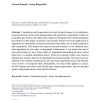Free Online Productivity Tools
i2Speak
i2Symbol
i2OCR
iTex2Img
iWeb2Print
iWeb2Shot
i2Type
iPdf2Split
iPdf2Merge
i2Bopomofo
i2Arabic
i2Style
i2Image
i2PDF
iLatex2Rtf
Sci2ools
101
click to vote
CP
2005
Springer
2005
Springer
Boosting Distributed Constraint Satisfaction
Abstract Competition and cooperation can boost the performance of a combinatorial search process. Both can be implemented with a portfolio of algorithms which run in parallel, give hints to each other and compete for being the first to finish and deliver the solution. In this paper we present a new generic framework for the application of algorithms for distributed constraint satisfaction that makes use of both cooperation and competition. This framework improves the performance of two different standard algorithms by one order of magnitude. Furthermore, it can reduce the risk of poor performance by up to three orders of magnitude diminishing the heavy-tailed behaviour of complete distributed search. Moreover it greatly reduces the classical idleness flaw usually observed in distributed tree-based searches. We expect our new methods to be similarly beneficial for any tree-based distributed search and describe ways on how to incorporate them. Remarkably, our ideas while applied to a...
Combinatorial Search Process | Complete Distributed Search | CP 2005 | Programming Languages | Tree-based Distributed Search |
Related Content
| Added | 26 Jun 2010 |
| Updated | 26 Jun 2010 |
| Type | Conference |
| Year | 2005 |
| Where | CP |
| Authors | Georg Ringwelski, Youssef Hamadi |
Comments (0)

